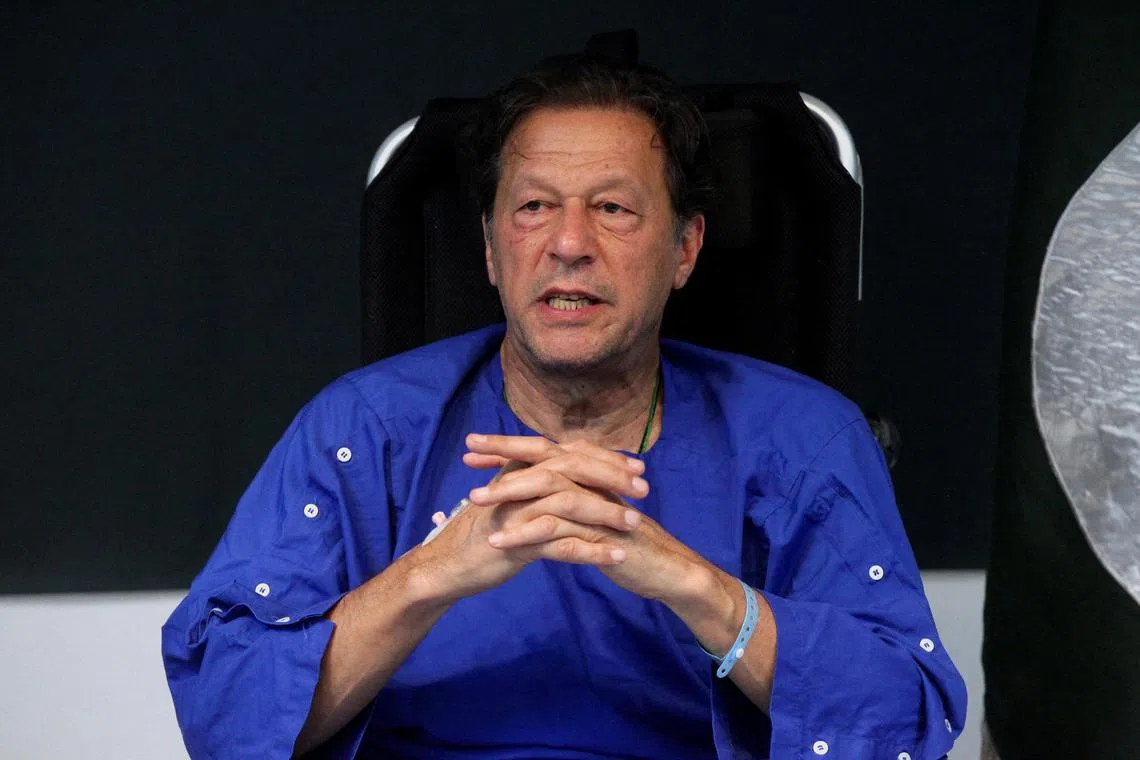Imran Khan’s popularity soars ahead of vote, Pakistan survey shows
Sign up now: Get insights on Asia's fast-moving developments

Pakistan's ex-leader Imran Khan’s approval ratings jumped to 61% in February from 36% in January 2022, the poll showed.
PHOTO: REUTERS
ISLAMABAD – An opinion poll has found that a majority of Pakistanis blame a coalition government for the soaring inflation in a country that is struggling to shore up finances and avoid a default, while support for former premier Imran Khan soared ahead of elections.
The poll was published by Gallup this week and was carried out between Feb 1 and 20.
It also found that 62 per cent of the 2,000 respondents blamed the Pakistan Democratic Movement (PDM) that makes up the government for the economic turmoil and inflation coming up to a six-decade high.
Mr Khan’s approval ratings in contrast jumped to 61 per cent in February 2023 from 36 per cent in January 2022, polling data showed.
The PDM alliance, led by Prime Minister Shehbaz Sharif’s Pakistan Muslim League-Nawaz (PML-N), had ousted Mr Khan in April 2022 through a no-confidence vote.
It pushed the narrative that the former cricket captain had mismanaged the economy.
Mr Shehbaz Sharif and his government have since made tough decisions to raise energy prices and taxes to revive a loan programme with the International Monetary Fund (IMF).
He has seen his popularity drop to 32 per cent in February 2023 from 51 per cent in January 2022.
“Imran Khan’s popularity rests on strong fundamentals of being a charismatic leader, giving slogans that resonate with the public while there is a vacuum in Pakistani politics,” said Mr Bilal Gilani, executive director at Gallup Pakistan.
“The real news is the major dent in the PML-N leaders’ ratings, which have seen an almost 20 per cent decline in their popularity. The IMF decisions have precipitated the decline, but the reasons were deeper and long term,” he added.
The economy is in dire straits, with almost one in five Pakistanis reporting they have either lost their jobs or know someone from their households who is out of work, according to the survey.
Mr Gilani said the government’s popularity declined due to a changing voter base, with the 18 to 30 age group now making up almost 45 per cent of the total.
This group tends to associate Mr Shehbaz Sharif and his elder brother, three-time premier Nawaz Sharif, with corruption.
This demographic has also struggled to relate with the party’s infrastructure development narrative.
Mr Nawaz Sharif, living in self-exile in London, has seen his support drop to 36 per cent from 55 per cent.
He is weighing a return to Pakistan to boost the party’s prospects for the general elections slated for later in 2023.
Pakistan is scheduled to hold polls in two of the four provinces in April, after Mr Khan’s party leaders dissolved the legislatures.
These elections will signal the public mood ahead of the national vote that will be held less than sixty days after the government term ends in August.
Mr Khan will begin campaigning for the provincial polls on Tuesday with a protest rally.
He has been pushing for early general elections, but Mr Shehbaz Sharif has said he wants to see through the IMF programme and the government term. BLOOMBERG


